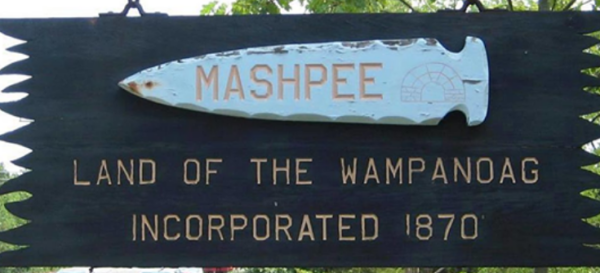
- Details
- By Levi Rickert
WASHINGTON — The House on Friday passed an amendment, as part of a package of appropriations bills, that protects the land of the Mashpee Wampanoag Tribe.
Two members of the Massachusetts congressional delegation, Rep. Joe Kennedy (D-MA) and Rep. Bill Keating (D-MA) and Rep. Lori Trahan (D-MA) introduced the amendment with Rep. Deb Haaland (D-N.M.), one of the first American Indian women elected to Congress.
At issue is 321 acres of land that was put into trust during the Obama administration in September 2015. The Obama decision was reversed by the Trump administration three years later in September 2018.
The amendment will impose a one-year moratorium on the Interior Department from spending any funds to take the Mashpee Wampanoag Tribe’s land out of trust. The amendment would further protect the Mashpee Wampanoag Tribe from endless litigation and fully recognize their tribal lands without interference from the federal government.
“This amendment is a major step toward the preservation of our culture, our traditions and our way of life. The support we’ve received – locally, by our lawmakers in D.C. and across Turtle Island – has been tremendous. The threat of disestablishment was real, but the action taken by Congress today brings us one step closer to avoiding a cultural crisis,” Chairman of the Mashpee Wampanoag Tribe Cedric Cromwell told Native News Online.
On Mar. 27, 2020, Cromwell received a call from the Bureau of Indian Affairs, an order delivered by the Secretary of the U.S. Department of the Interior David Bernhardt, that the tribe’s “reservation be disestablished.”
On Mar. 30, 2020, to stop Bernhardt’s directive, the Mashpee Wampanoag Tribe filed an emergency injunction and temporary restraining order in the Federal District Court for the District of Columbia. In June, a federal judge ruled in the tribe’s favor, but still allowed the Interior Department to make a new determination.
Kennedy was not pleased with the Trump administration’s attempt to take the land out of trust and worked with his colleagues to protect the tribe’s trust land through congressional legislation.
“Four hundred years ago, the pilgrims settled on the Mashpee Wampanoag Tribe’s land and they have been forced to fight for their sovereignty and survival ever since,” Rep. Kennedy said. “In recent months, the Trump administration has used the COVID-19 pandemic as cover to try to steal the tribe’s land and define their people out of existence. This amendment will put an immediate stop to those dangerous efforts.”
Kennedy and Keating originally introduced the Mashpee Wampanoag Tribe Reservation Protection Act to protect tribal reservation lands after filing an amicus brief on behalf of the Reaffirmation Act, which passed the House in 2019.
Last month, Haaland and Kennedy introduced the Tribal Reservation Pandemic Protection Act.
More Stories Like This
Native News Weekly (August 25, 2024): D.C. BriefsNavajo Nation Mourns the Passing of Former Vice President Rex Lee Jim
Deb Haaland Earns Endorsement From Communications Workers of America Local 7076
University Soccer Standout Leads by Example
Two Native Americans Named to Democratic Congressional Campaign Committee's“Red to Blue” Program
Help us defend tribal sovereignty.
At Native News Online, our mission is rooted in telling the stories that strengthen sovereignty and uplift Indigenous voices — not just at year’s end, but every single day.
Because of your generosity last year, we were able to keep our reporters on the ground in tribal communities, at national gatherings and in the halls of Congress — covering the issues that matter most to Indian Country: sovereignty, culture, education, health and economic opportunity.
That support sustained us through a tough year in 2025. Now, as we look to the year ahead, we need your help right now to ensure warrior journalism remains strong — reporting that defends tribal sovereignty, amplifies Native truth, and holds power accountable.
 The stakes couldn't be higher. Your support keeps Native voices heard, Native stories told and Native sovereignty defended.
The stakes couldn't be higher. Your support keeps Native voices heard, Native stories told and Native sovereignty defended.
Stand with Warrior Journalism today.
Levi Rickert (Potawatomi), Editor & Publisher

